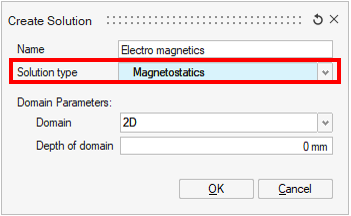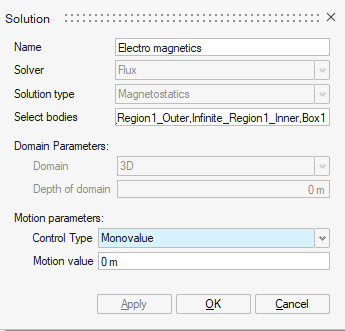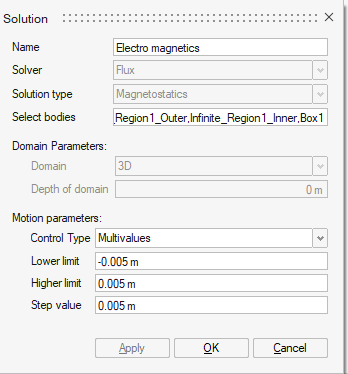Magnetostatic solution
![]()
Introduction
The Magnetostatic application allows the user to study the phenomena created by a magnetostatic field. The magnetic field is related to the presence of DC currents (stationary currents) and/or of permanent magnets.

- 2D Magnetostatic (2D and AxiSymmetric solutions have the same workflow)
- 3D Magnetostatic
Use
The Magnetostatic application can be used to model different devices.
Thus, we can compute:
- he magnetic field in the structures with magnets for particle accelerators, spectrometers or MRI magnets, attenuation of the magnetic field due to the magnetic shieldings, the field of magnetic reading heads
- the forces in magnetic bearings, in the electromagnets and in the contactors
- the torques in rotating machines and micromotors
- the self-inductance and mutual inductances of different devices (transformers, coil-ends of rotating machines...)
Solution dialog box
- The magnetostatic solution is available for 2D, 3D and Axisymmetric cases.
- In case of 2D the domain depth must be defined to take into account the electromagnetic effects in the third dimension.
- In 3D Magnetostatic containing Motion load, once the
Motion load is created, the solution dialog box is updated with new inputs:
the Motion parameters to pilot the position of the
moving bodies during the solving:
Table 1. 3D Magnetostatic piloted by a Monovalue 3D Magnetostatic piloted by Multivalues 

Monovalue allows to solve with the entered position. Multivalues allow to solve with the position varying from a Lower limit to a Higher limit with a Step value. For more information on the Motion, please refer to MS3D Motion
Typical example
A typical example of a problem treated as a Magnetostatic application is presented in the figure below.
: air or vacuum
: magnetic
environment (non-conducting)
: conducting
environment (non magnetic)